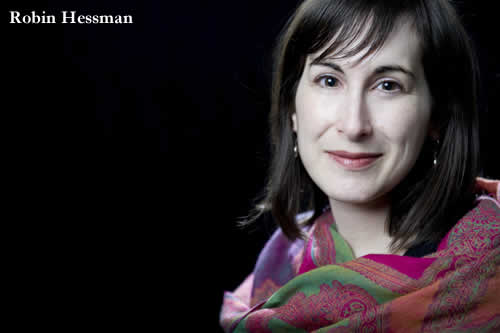 When the USSR broke apart in 1991, a generation of young people faced a new realm of possibilities. An intimate epic about the extraordinary lives of this last Soviet generation, Robin Hessman’s feature documentary, My Perestroika, tells the stories of five Moscow schoolmates who were brought up behind the Iron Curtain, witnessed the joy and confusion of glasnost, and reached adulthood right as the world changed around them. Through candid first-person testimony, revealing verité footage, and vintage home movies, Hessman—who spent many years living in Moscow—reveals a Russia rarely ever seen on film; where people are frank about their lives and forthcoming about their country.
When the USSR broke apart in 1991, a generation of young people faced a new realm of possibilities. An intimate epic about the extraordinary lives of this last Soviet generation, Robin Hessman’s feature documentary, My Perestroika, tells the stories of five Moscow schoolmates who were brought up behind the Iron Curtain, witnessed the joy and confusion of glasnost, and reached adulthood right as the world changed around them. Through candid first-person testimony, revealing verité footage, and vintage home movies, Hessman—who spent many years living in Moscow—reveals a Russia rarely ever seen on film; where people are frank about their lives and forthcoming about their country.
Bijan Tehrani: How did you originally come up with the idea of making My Perestroika?
Robin Hessman: Well, I lived in Russia from 1991 to 1999. Part of those years were as an undergraduate and I also went to film school in Moscow and I produced the Russian Sesame Street when it started, so I did a lot for the latter 4 and a half years. So I was there for my entire early adult life, from the age of eighteen to about twenty-seven, and when I came 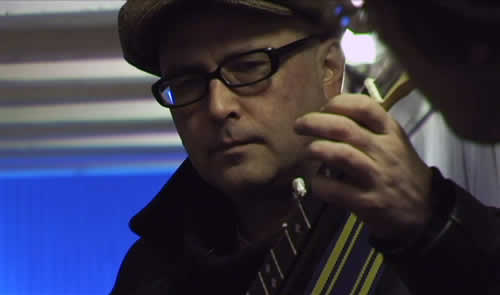 back to the states I was, of course, asked a lot of questions about what it was like. It was so impossible to sum up, in a phrase or two, my experiences and to describe how Russia has made the transition from communism to capitalism; it was difficult even to explain current Russian feelings and attitudes towards life. The kind of societal change that happened in Russia from the late 80’s to the early 90’s to now, it is so complicated and multifaceted that it is indifferent. It is complicated for the entire country; it is certainly complicated for Russians. It was just impossible for me to give a nice, quick, and clean answer in a sentence or two, so I thought about how to make a film to try and best share the experiences of my generation of Russian. This generation is unique because they were the last generation of Soviet Kids: They grew up in a completely normal Soviet childhood and they never thought that the USSR would collapse. They were just coming of age when Gorbachov came to power and then they graduated from college and embarked on their lives as adults in the same year that the Soviet Union collapsed. So, they had to figure everything out with no model to follow, and I found this out first-hand from my own friends. That is really where the idea came from, and I also realized that there had been some wonderful programs that also analyzed the Soviet Union from an abstract GeoPool historical point of view, but I had not seen a story that revolved around “ordinary people” and not from outsiders, historians, analysts, famous people, politicians, or the extreme cases of drug-addict Soviets living under tunnel—just an ordinary person with which people can relate to in their own lives. So this seemed like story that hadn’t yet been told.
back to the states I was, of course, asked a lot of questions about what it was like. It was so impossible to sum up, in a phrase or two, my experiences and to describe how Russia has made the transition from communism to capitalism; it was difficult even to explain current Russian feelings and attitudes towards life. The kind of societal change that happened in Russia from the late 80’s to the early 90’s to now, it is so complicated and multifaceted that it is indifferent. It is complicated for the entire country; it is certainly complicated for Russians. It was just impossible for me to give a nice, quick, and clean answer in a sentence or two, so I thought about how to make a film to try and best share the experiences of my generation of Russian. This generation is unique because they were the last generation of Soviet Kids: They grew up in a completely normal Soviet childhood and they never thought that the USSR would collapse. They were just coming of age when Gorbachov came to power and then they graduated from college and embarked on their lives as adults in the same year that the Soviet Union collapsed. So, they had to figure everything out with no model to follow, and I found this out first-hand from my own friends. That is really where the idea came from, and I also realized that there had been some wonderful programs that also analyzed the Soviet Union from an abstract GeoPool historical point of view, but I had not seen a story that revolved around “ordinary people” and not from outsiders, historians, analysts, famous people, politicians, or the extreme cases of drug-addict Soviets living under tunnel—just an ordinary person with which people can relate to in their own lives. So this seemed like story that hadn’t yet been told.
BT: How challenging was it to make My Perestroika?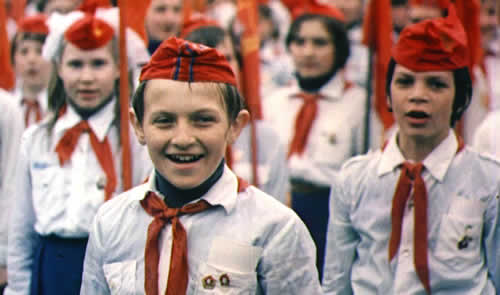 RH: It was incredibly challenging because there are so many different aspects of the project. I wanted to juxtapose the official state archival material with intimate and personal 8mm home video footage, especially because the whole movie is a personal view of the everyday life that people went through during the cold war and the iron curtain. We found some things in the state archival footage like soldiers and tanks in the square and people waiting in line for food, but we never really saw a child priest or a grandfather learning to ride a bike and just the sort of very human parts of everyday life. I was looking for so many different types of footage and then I had to tell the story of several individuals from the same class and balance each of their stories along with the story of the country; All this whilst making the film acceptable for audiences both familiar and unfamiliar with Russia. So yes, it was challenging along the whole way to create and also to raise money. Being an independent, non-profit, documentary filmmaker, it was very hard. It took many years; right now it has been about six-and-a-half years, exactly six-and-a-half years since I started working on the film.
RH: It was incredibly challenging because there are so many different aspects of the project. I wanted to juxtapose the official state archival material with intimate and personal 8mm home video footage, especially because the whole movie is a personal view of the everyday life that people went through during the cold war and the iron curtain. We found some things in the state archival footage like soldiers and tanks in the square and people waiting in line for food, but we never really saw a child priest or a grandfather learning to ride a bike and just the sort of very human parts of everyday life. I was looking for so many different types of footage and then I had to tell the story of several individuals from the same class and balance each of their stories along with the story of the country; All this whilst making the film acceptable for audiences both familiar and unfamiliar with Russia. So yes, it was challenging along the whole way to create and also to raise money. Being an independent, non-profit, documentary filmmaker, it was very hard. It took many years; right now it has been about six-and-a-half years, exactly six-and-a-half years since I started working on the film.
BT: How much of your time was spent editing My Perestroika?
RH: I knew in the very beginning that I conceived the film in 3 stages: the Soviet childhood, hair striker youth, and the present day. It was certainly time-consuming to get those three stages of life, each individual story of the five subjects, archival material, and a fluid narrative. I worked with two different and wonderful editors and it just took a lot of time. In the early stages we had really wonderful scenes individually, but the whole film was not working in terms of structure. So it just took a lot of trial and error and a lot of editing. My editor 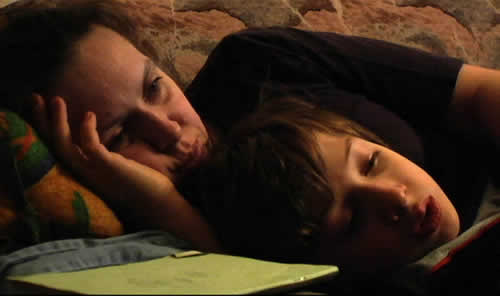 and I were lucky enough to attend the Sundance Documentary labs in the summer of ’09. That program was also very helpful in crystallizing the direction that we needed to go in and to narrow our story down to the five primary narratives. So yes, editing was very time consuming, and in a lot of documentaries the editing process is kind of the writing of the film.
and I were lucky enough to attend the Sundance Documentary labs in the summer of ’09. That program was also very helpful in crystallizing the direction that we needed to go in and to narrow our story down to the five primary narratives. So yes, editing was very time consuming, and in a lot of documentaries the editing process is kind of the writing of the film.
BT: How did you come up with the visual style of your film?
RH: I filmed it myself and I did not plan to film it myself. It turned out to be a necessity because I needed my interview subjects to feel as comfortable as possible. The first day of shooting, I had a camera man there and the whole feeling really shifted. Peoples’ kitchens were very small and there was not much room and it really altered everything so much that I came to understand that I could not make this film with somebody else shooting it. I was very nervous about it though. I wanted to be focus mainly on the subject of the film and was very concerned about my mind being half distracted by audio levels and focus, but in the end it turned out to be the best thing I the world. It soon became second nature and it soon allowed for a completely intimate and very open atmosphere because it was mostly just me and the camera during filming. So how did I come up with the visual style? Well, I did not want to set up formal interviews; I really viewed it more as having conversation. I wasn’t outwardly focused on filming and I just hoped that the atmosphere of ease would come across and the audience would feel comfortable with the subjects and feel that they were also in their kitchen, having tea with them. I filmed on a monopod, and that was usually stuck in my pocket because handheld got too difficult and I did not want it to shake that much. A tripod was too difficult because I was following people around as they got up and moved around, so the monopod really was the perfect base for me.
BT: How has the reaction been to My Perestroika?
RH: Really wonderful, and this has been so exciting! You spend years and years working on a film that you sort of see in your imagination and it is so exciting to see it with an 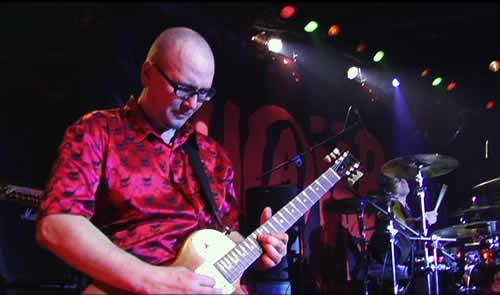 audience. I really love the Q&A’s and hearing the audience reaction, what they thought of the film and their comparisons with their own childhoods. Whether they are from Easter Europe or whether they have not been there at all, people have their favorites between the five of them and it’s been very exciting. Premiering at Sundance last year was fantastic and it was a real thrill and honor. Some of the festivals that we have been through over the years have been really wonderful and it has taken me to parts of the worlds that I have not been to before, and even when I haven’t been able to travel we have a community on Facebook! There is this page for the film and for people who have seen the film in places I have not been able to travel to, like Romania, Lithuania, South Korea and Brazil. People have written comments and asked questions in the Facebook group. So it is really kind of amazing to see how the film is being perceived all over the world, and now the film is being released in theaters. It has been really wonderful, the audiences have been great, and it is satisfying that the people resonates strongly with individuals. It is interesting how people talk about the timing of it in regards to how people in Egypt or Tunisia might think, years after their own upheavals and revolutions. They are different stories but very similar stories; it’s not about politics, it is not about government, it is about people and it is about what it is to be at a certain point in your life and experiencing historical and political change. I have been told by people from other countries in Eastern Europe that they approached the film very practically and thought that it would mean nothing for them because they are not Russian, but they tell of how the film actually was reflective of their childhood as well. This is because people in so many countries have experiences of this kind of change happening in their own lives and it does not matter who was the president or what kind of the government was present, but I really tried to tell a human story of people growing up in a time of change.
audience. I really love the Q&A’s and hearing the audience reaction, what they thought of the film and their comparisons with their own childhoods. Whether they are from Easter Europe or whether they have not been there at all, people have their favorites between the five of them and it’s been very exciting. Premiering at Sundance last year was fantastic and it was a real thrill and honor. Some of the festivals that we have been through over the years have been really wonderful and it has taken me to parts of the worlds that I have not been to before, and even when I haven’t been able to travel we have a community on Facebook! There is this page for the film and for people who have seen the film in places I have not been able to travel to, like Romania, Lithuania, South Korea and Brazil. People have written comments and asked questions in the Facebook group. So it is really kind of amazing to see how the film is being perceived all over the world, and now the film is being released in theaters. It has been really wonderful, the audiences have been great, and it is satisfying that the people resonates strongly with individuals. It is interesting how people talk about the timing of it in regards to how people in Egypt or Tunisia might think, years after their own upheavals and revolutions. They are different stories but very similar stories; it’s not about politics, it is not about government, it is about people and it is about what it is to be at a certain point in your life and experiencing historical and political change. I have been told by people from other countries in Eastern Europe that they approached the film very practically and thought that it would mean nothing for them because they are not Russian, but they tell of how the film actually was reflective of their childhood as well. This is because people in so many countries have experiences of this kind of change happening in their own lives and it does not matter who was the president or what kind of the government was present, but I really tried to tell a human story of people growing up in a time of change.
BT: Do you have any new projects lined up?
RH: There are a few things that I am thinking of, but I am still working full time on distribution for this film.
BT: Thank you so much for your time and insight into your filmmaking!

